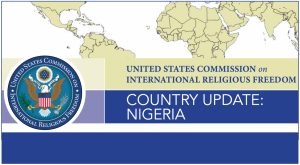 USCIRF is an independent, bipartisan federal government entity established by the US Congress to monitor and report on religious freedom abroad. It makes foreign policy recommendations to the President, the Secretary of State and Congress intended to deter religious persecution and promote freedom of religion and belief.
USCIRF is an independent, bipartisan federal government entity established by the US Congress to monitor and report on religious freedom abroad. It makes foreign policy recommendations to the President, the Secretary of State and Congress intended to deter religious persecution and promote freedom of religion and belief.
The report’s opening paragraph states: “Nigeria continues to experience systematic, ongoing, and egregious violations of freedom of religion or belief (FoRB). The government uses blasphemy laws to prosecute and imprison individuals perceived to have insulted religion, including Christians, Muslims, and humanists. It also continues to tolerate egregious violence by nonstate actors, including JAS/Boko Haram, the Islamic State West Africa Province (ISWAP), and other extremist groups. This violence affects large numbers of Christians and Muslims in several states across Nigeria and targets both religious sites and individuals from religious minority communities.” JAS or Jama’at Ahl al-Sunna lid-Dawah wa’al-Jihad (the Sunni Muslim Group for Dawah and Jihad) is the official name of Boko Haram.
The main body of the report is divided into sections that deal with “Blasphemy laws and Shari’a codes” and “Violent nonstate actors”, the latter a longer section that covers Fulani bandits, Islamist insurgents and the Nigerian government’s counterinsurgency campaign.
Blasphemy laws and Shari’a codes
Nigeria’s constitution permits the use of Shari’a and traditional law courts for noncriminal proceedings at state level, although it does not compel all citizens to abide by them. Twelve states in northern Nigeria plus the Federal Capital Territory have implemented Shari’a legal frameworks and some are applying Shari’a in criminal cases. Shari’a codes prohibit blasphemy and other offences based on Islamic law as interpreted by each state’s high court. Shari’a courts specify punishments such as caning, amputation and stoning.
 The Nigerian government continues to imprison individuals accused of blasphemy – several individuals have been convicted of blasphemy and are serving long prison sentences – and often fails to pursue perpetrators of violence related to blasphemy allegations. The report mentions Rhoda Jatau (pictured), a Christian healthcare worker from Bauchi state in northern Nigeria who was accused of blasphemy and jailed in May 2022. She was released on bail in December 2023 and is awaiting trial.
The Nigerian government continues to imprison individuals accused of blasphemy – several individuals have been convicted of blasphemy and are serving long prison sentences – and often fails to pursue perpetrators of violence related to blasphemy allegations. The report mentions Rhoda Jatau (pictured), a Christian healthcare worker from Bauchi state in northern Nigeria who was accused of blasphemy and jailed in May 2022. She was released on bail in December 2023 and is awaiting trial.
Violent nonstate actors
According to the report, “Nigeria’s government at federal and state level continues to tolerate attacks by nonstate actors who justify their violence on religious grounds. Islamist and some Fulani militant groups have expressed a goal of overthrowing secular governance with the intention of enforcing a singular interpretation of Islam.”
Fulani bandits
Some 30,000 “Fulani bandits” reportedly operate in northwest Nigeria, in groups of between ten and one thousand members. These groups target predominantly Christian communities (although they also attack Muslims) and pose the greatest security threat in northwest Nigeria. Their activities include kidnap, rape, property and cattle theft, illegal possession of weapons and murder. The report notes that the conflict is magnified by competition for natural resources between Christian farmers and Muslim Fulani herders.
Fulani bandits carry out kidnappings for ransom and in several cases they have kidnapped students from Christian schools or buses on the way to school. They generally release hostages unharmed if ransom demands are met but President Tinubu has requested victims’ families not to pay ransom demands to discourage further kidnapping. Victims’ families have criticised the government for its slow response to kidnappings and its failure to prevent them.
One of several cases mentioned in the report occurred on 7 March 2024, when bandits kidnapped 287 school students between the ages of seven to 15 in Kuriga, Kaduna state, in an event a Catholic bishop attributed to corruption and a lack of transparency in the government.
Islamist insurgents
Separate to the Fulani militants, the report discusses several Islamist insurgent groups that are active in Nigeria. Boko Haram was founded in 2002 in northeast Nigeria and gained notoriety for attacks on civilians, especially Christians in Borno State, and for the kidnapping of the Chibok girls. The report notes that its breakaway faction ISWAP (Islamic State West Africa Province), in contrast to Boko Haram, generally spares Muslim civilians.
Among many examples listed is a case from January 2024 when 14 people in Yobe State including the local Church of Christ in Nigeria pastor were killed by suspected JAS/Boko Haram insurgents.
In March, the insurgents abducted several hundred hostages, mostly women and children, in Borno State near an internally displaced persons camp hosting many Christians. The government has closed most camps in the area, putting further pressure on these Christian communities.
In June, suspected JAS/Boko Haram insurgents killed 18 people and wounded 42 in Borno State, with female suicide bombers targeting a wedding ceremony and separate attackers targeting the funeral of those killed in the wedding bombing.
The report states that in 2022 ISWAP began to expand its operations into Nigeria’s southern states to exploit their greater relative wealth and secure natural resources such as oil. However, these attacks have reportedly reduced since late 2023 – a reduction that the writers of the report suggest may be because ISWAP is strategically countering its main rival JAS/Boko Haram and government forces in the north, or possibly because it is waiting to resupply its units in the south with arms and fighters.
The smaller Ansaru group, which is affiliated to al-Qaeda, also competes for power in Nigeria and in May 2024 its gunmen reportedly kidnapped 160 mainly Christian children and killed eight people in a village in Niger State.
Government Counterinsurgency Campaign
The Nigerian military continues to combat Islamist groups such as ISWAP and JAS/Boko Haram and has reportedly considered using counterinsurgency tactics and weapons against Fulani armed groups. The government generally utilises both the military and special federal police units for counterinsurgency.
Since February 2024 government forces have killed bandit leaders in northwest Nigeria, but these operations have reportedly resulted in abuses. In March, the National Human Rights Commission announced the conclusion of its probe into a military-led forced abortion programme. The Commission did not reveal the findings or indicate if they would be made public, but in 2022 a Reuters investigation found that since 2013 the army had forcibly terminated thousands of pregnancies that were the result of rape by Islamist insurgents in northeast Nigeria.
In another reported abuse, in April 2024 an army unit fired on Christian students protesting Fulani attacks on Christian villages in Plateau State.
Conclusion
The report concludes that Nigeria’s government continues to impose systematic restrictions on freedom of religion or belief through blasphemy laws and other Shari’a-based provisions but also acknowledges that there appears to be a willingness on the part of the Nigerian government, including state governors, to discuss the security situation more openly.
Nigeria’s government is becoming more active in pursuing violent nonstate actors and in spring 2024 it successfully resolved two major kidnapping events: in March bandits released over 130 unharmed school students in Kaduna State; and in May army troops and police units rescued hundreds of JAS/Boko Haram hostages in the Sambisa forest in northeast Nigeria, mainly women and children who had been held there for months or even years.
In its 2024 Annual Report, USCIRF recommended that the US Department of State designate Nigeria as a Country of Particular Concern for its government’s engagement in and toleration of particularly severe violations of religious freedom.
Read the full report.
Read Church in Chains’ Nigeria Country Profile.
(United States Commission on International Religious Freedom)
Photo: Morning Star News/Facebook
